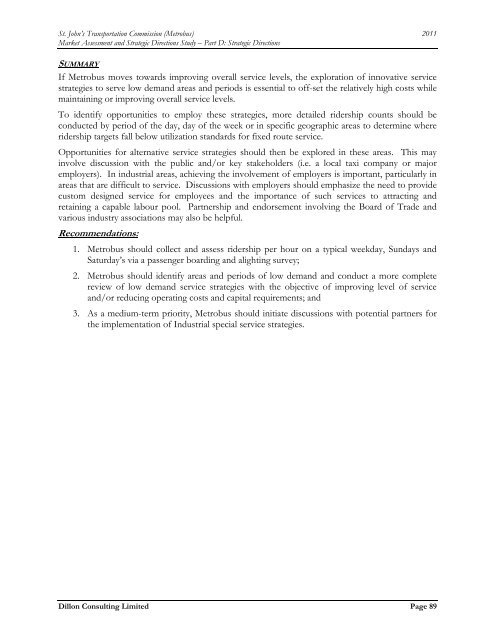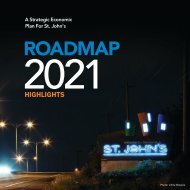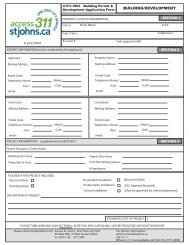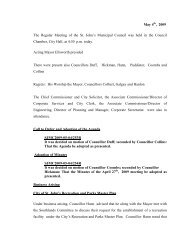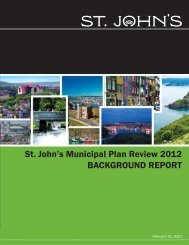Metrobus Transit Study.pdf - City of St. John's
Metrobus Transit Study.pdf - City of St. John's
Metrobus Transit Study.pdf - City of St. John's
Create successful ePaper yourself
Turn your PDF publications into a flip-book with our unique Google optimized e-Paper software.
<strong>St</strong>. John’s Transportation Commission (<strong>Metrobus</strong>) 2011<br />
Market Assessment and <strong>St</strong>rategic Directions <strong><strong>St</strong>udy</strong> – Part D: <strong>St</strong>rategic Directions<br />
SUMMARY<br />
If <strong>Metrobus</strong> moves towards improving overall service levels, the exploration <strong>of</strong> innovative service<br />
strategies to serve low demand areas and periods is essential to <strong>of</strong>f-set the relatively high costs while<br />
maintaining or improving overall service levels.<br />
To identify opportunities to employ these strategies, more detailed ridership counts should be<br />
conducted by period <strong>of</strong> the day, day <strong>of</strong> the week or in specific geographic areas to determine where<br />
ridership targets fall below utilization standards for fixed route service.<br />
Opportunities for alternative service strategies should then be explored in these areas. This may<br />
involve discussion with the public and/or key stakeholders (i.e. a local taxi company or major<br />
employers). In industrial areas, achieving the involvement <strong>of</strong> employers is important, particularly in<br />
areas that are difficult to service. Discussions with employers should emphasize the need to provide<br />
custom designed service for employees and the importance <strong>of</strong> such services to attracting and<br />
retaining a capable labour pool. Partnership and endorsement involving the Board <strong>of</strong> Trade and<br />
various industry associations may also be helpful.<br />
Recommendations:<br />
1. <strong>Metrobus</strong> should collect and assess ridership per hour on a typical weekday, Sundays and<br />
Saturday’s via a passenger boarding and alighting survey;<br />
2. <strong>Metrobus</strong> should identify areas and periods <strong>of</strong> low demand and conduct a more complete<br />
review <strong>of</strong> low demand service strategies with the objective <strong>of</strong> improving level <strong>of</strong> service<br />
and/or reducing operating costs and capital requirements; and<br />
3. As a medium-term priority, <strong>Metrobus</strong> should initiate discussions with potential partners for<br />
the implementation <strong>of</strong> Industrial special service strategies.<br />
Dillon Consulting Limited Page 89


